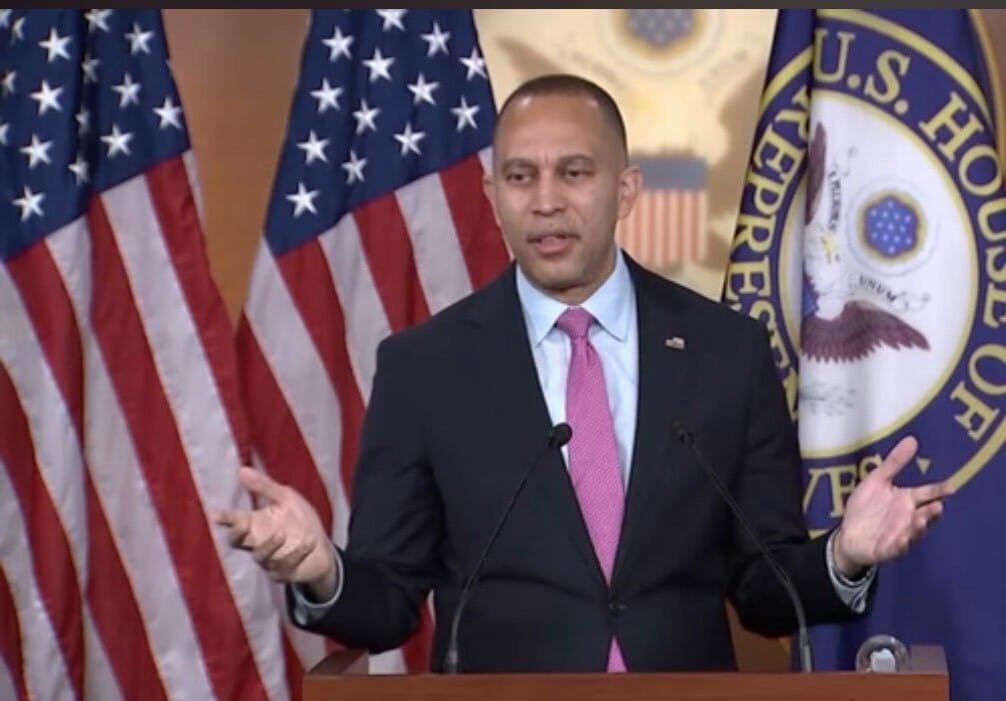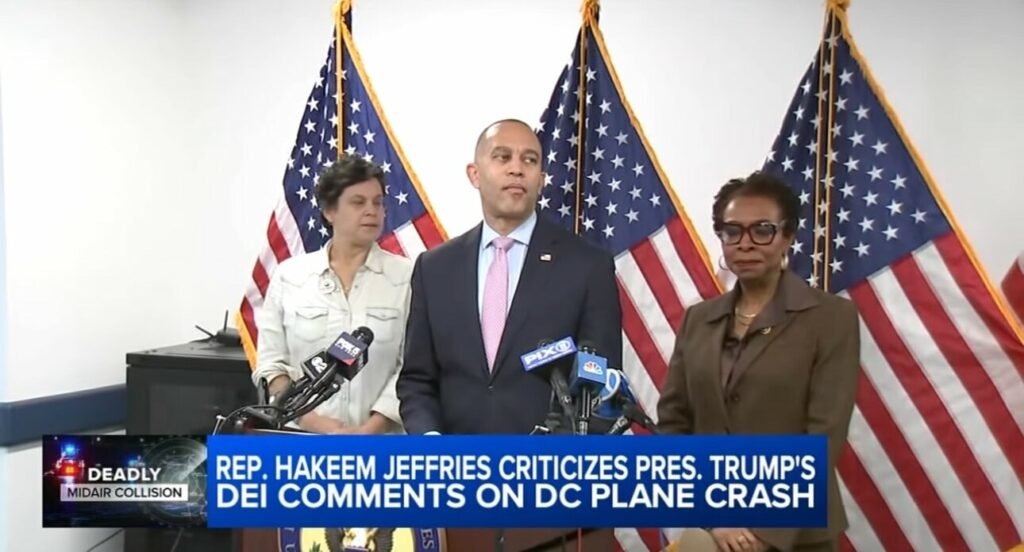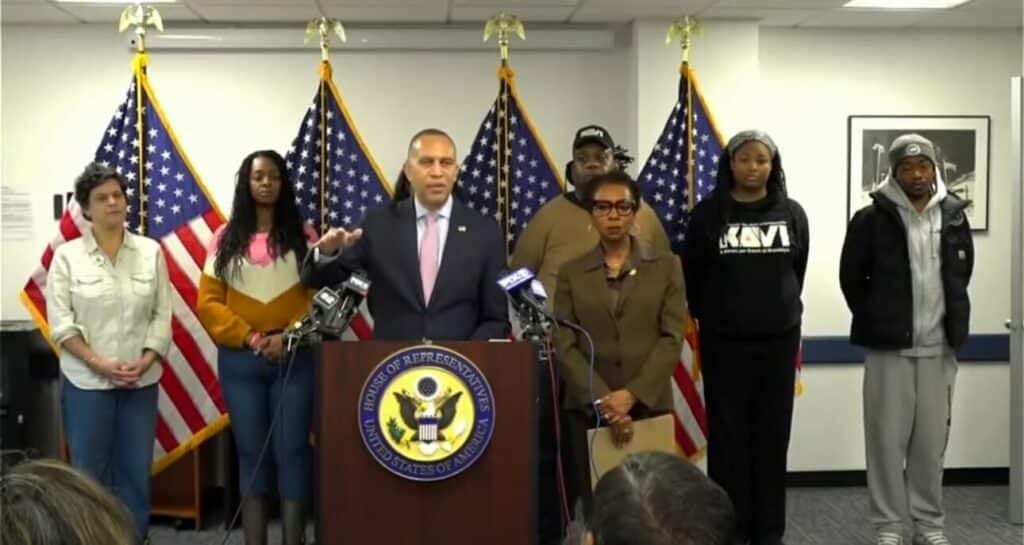Democrats Reject White House Demand for Jeffries Apology
Congressional Democrats are dismissing the White House’s demand for an apology after House Minority Leader Hakeem Jeffries, D-N.Y., urged people to “fight” President Donald Trump’s agenda “in the streets.”
This event could change how the White House and Congress work together. The Hakeem Jeffries situation is getting a lot of attention. Everyone is waiting to see what happens next.
Key Takeaways
- The White House has demanded an apology from Hakeem Jeffries, a move that has been rejected by the Democrats.
- The incident has sparked intense debate and discussion, with many seeking to understand the reasoning behind the White House’s demand.
- The democrats reject white house demand, and the Hakeem Jeffries incident may set a precedent for future interactions between the White House and Congress.
- The situation will likely continue to be a major topic of discussion in the coming days, with many awaiting the next move from both parties.
- The Hakeem Jeffries incident is a significant development in the world of political news, with implications for the current political landscape.
- The democrats reject white house demand, and the incident will likely have a lasting impact on the relationship between the White House and Congress.
Breaking Down the White House Demand for Hakeem Jeffries’ Apology
The White House wants Hakeem Jeffries to apologize for a statement he made. This statement has caused a big fight between parties. The Democrats are standing together, saying they won’t apologize.
This whole situation started with a lot of different interests involved. The Democrats are very clear in their support for Jeffries. It looks like the fight between parties will keep going, with no one giving in.
Some important things to remember in this fight include:
- The White House asking for an apology is seen as too much by many Democrats.
- The Democrats are standing strong against the demand.
- This fight could really change the political scene.
This demand for an apology is just one part of the ongoing fight in Washington. As things keep going, it’s clear this will affect how parties work together in Congress.
| Party | Response to White House Demand |
|---|---|
| Democratic Party | United in their response, refusing to apologize |
| Republican Party | Supporting the white house demand for an apology |
Democratic Party’s United Response to the Demand
The Democratic Party has stood together against the White House demand. They reject it and support House Minority Leader Hakeem Jeffries. This democratic party response shows unity, with over 70% of House Democrats backing Jeffries.
The white house demand for an apology has faced resistance. Many Democrats see it as trying to silence them. The party’s government statement shows their commitment to their values, even when faced with opposition.
Some key points about the Democratic Party’s response include:
- Unity among House Democrats, with over 70% standing by Jeffries
- Resistance to the White House demand for an apology
- Emphasis on standing up for their values and principles
The Democratic Party’s united stance has big implications for politics now. They won’t give in to opposition. The democratic party response is strong, and we’ll see how things unfold.
Political Implications and Party Tensions
The White House’s call for Jeffries’ apology has big political implications. It could affect how laws are made and who leads the party. The current us politics scene is tense, and this demand might make things worse.
In us politics, asking for an apology is seen as a way to distract from important issues. This move could change the political scene a lot. It might affect the Democratic Party and the whole political scene.
Some important things to think about are:
- How it might change how laws are made, which often needs both parties to agree.
- The rise in party tensions, leading to more division and less working together.
- The media’s role in shaping what people think and how it affects us politics.
The situation is complex, and the political implications of asking for an apology will be seen for a while. As things keep happening, we need to think about how it will affect the Democratic Party, us politics, and the country.
| Category | Potential Impact |
|---|---|
| Legislative Negotiations | Potential decrease in bipartisan cooperation |
| Party Tensions | Increase in polarization and decreased cooperation |
| US Politics | Shift in public perception and possible effects on the Democratic Party |
Historical Context of Similar Political Disputes
Understanding the historical context of similar political disputes is key. The US has faced many government statements and actions causing political disputes with other countries. For example, the US’s 25-percent tariffs on Mexico and Canada led to these countries retaliating.
Looking back at past political disputes, we see a pattern. Tensions rise and countries take action. The US’s trade deficit with Canada is expected to be $55 billion in 2024. This could lead to more government statements and actions.
The Canadian Prime Minister has announced 25 percent tariffs on some American goods worth Can$155 billion. This shows how political disputes can hurt the economy.
The Wall Street Journal called the tariffs “The Dumbest Trade War in History.” They point out the harm to American consumers. This shows why looking at past political disputes is important.
When we look at the historical context of similar political disputes, we should consider:
- Past government statements and actions that have led to political disputes
- Retaliatory measures taken by other countries in response to US actions
- Economic consequences of political disputes, such as trade deficits and tariffs
- Media coverage and public perception of political disputes
By studying the historical context of similar political disputes, we can better understand today’s situation. This helps us see the possible outcomes of government statements and actions. It also guides us in finding ways to solve political disputes.
Conclusion: The Future of Bipartisan Relations in Congress
The White House’s demand for Rep. Hakeem Jeffries’ apology has shown the deep divisions in Congress. The Democratic Party refuses to apologize, leaving the future of working together uncertain.
This dispute could affect ongoing talks in Congress. The public and media will watch closely. Their views on the parties’ ability to work together will change.
For the country’s big issues, Congress needs to work together. Lawmakers must put aside their differences to find common ground. This will guide American politics into the future.
After this, Congress needs to focus on being civil and open. They must truly want to solve problems for the American people. Only then can they break through the gridlock and achieve bipartisan success.
FAQ
What is the key issue in the Democrats’ rejection of the White House’s demand for Hakeem Jeffries’ apology?
What are the details of the White House’s demand for Jeffries’ apology?
How has the Democratic Party responded to the White House’s demand?
What are the political implications and party tensions resulting from the White House’s demand?
How does this incident fit into the historical context of similar political disputes?
Source Links
- Trump says tariff ‘pain’ will be ‘worth the price’
- Paradise Lost? A bigger Palm Springs airport is not a better Palm Springs airport
- ‘UPFRONT’: Baldwin says no Congressional crash investigation needed
- Oklahomans push back on transmission projects even as the state’s energy needs continue to grow
- Whether Lombardo and legislators like it or not, Trump’s malignancy looms over the session
- France’s new PM announces ‘nuclear’ measure to pass budget
- Dems dismiss calls for apology after Jeffries vows ‘fight’ against Trump agenda ‘in the streets’
- Florida Republicans just declared war on each other
- Fiery resignation by Pa.’s consumer advocate breeds fear office will lose independence
- Sen. Tillis opens up about role in Pete Hegseth’s confirmation after Hegseth’s ex-sister-in-law’s allegations









